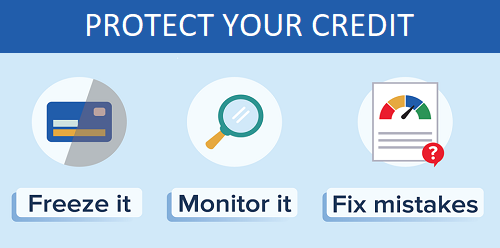Credit Freeze or Fraud Alert: What's Right for Your Credit Report?
You can place both a credit freeze and any type of fraud alert.
Credit Freeze
You don’t have to wait for your Social Security number or other information to be exposed in a data breach — or misused by an identity thief — to benefit from a credit freeze.
Here’s how a credit freeze can protect you: it stops lenders from getting into your credit report. Because lenders usually won’t give you credit if they can’t review your credit report, a freeze can help stop would-be identity thieves from opening new accounts in your name.
Some more things to know:
- Anyone can place a credit freeze, they’re free to place and lift, and they don’t affect your credit score.
- To place a credit freeze, contact all three credit bureaus: Equifax, Experian, and TransUnion.
- Credit freezes last until you lift them. So, if someone needs to check your credit — like if you’re applying for a new credit card or a car loan — you’ll need to contact all three bureaus again. (Or, if you know which bureau a lender will use, you can lift for only that one. For free.)
You may have also heard about fraud alerts, which are another useful tool against identity theft.
Initial fraud alert
- What it does: An initial fraud alert tells businesses to check with you before opening a new account in your name. Usually, that means contacting you first to make sure the person trying to open a new account is really you. Unlike a credit freeze, a fraud alert doesn’t prevent businesses from seeing your credit report. Use this fraud alert when you’re concerned about identity theft. It makes it harder for someone to open a new credit account in your name. It’s free and lasts one year.
- Who can place one: Anyone who suspects fraud. When you place an initial fraud alert on your credit report, you can get a free copy of your credit report from each of the three credit bureaus.
- How long it lasts: An initial fraud alert lasts one year. You can choose to renew it.
- Cost: Free
- How to place one: Contact any one of the three credit bureaus — Equifax, Experian, or TransUnion. You don’t have to contact all three. The credit bureau you contact must tell the other two to place an initial fraud alert on your credit report.
Extended fraud alert
- What it does: Like an initial fraud alert, an extended fraud alert will make it harder for someone to open a new credit account in your name. A business must contact you before it issues new credit in your name. Use this fraud alert when you’ve had your identity stolen and completed an FTC identity theft report at IdentityTheft.gov or filed a police report.
- Review your credits report weekly at AnnualCreditReport.com, and ask for an extra report for 12 months when an alert is in place.
- The credit bureaus will also take you off their marketing lists for unsolicited credit and insurance offers for five years, unless you ask them not to.
- Who can place one: People who experienced identity theft and who have completed an FTC identity theft report at IdentityTheft.gov or filed a police report.
- How long it lasts: An extended fraud alert lasts seven years. You’ll have the choice to renew it, but you’ll have to resubmit your FTC identity theft report or police report.
- Cost: Free
- How to place one: Contact any one of the three credit bureaus — Equifax, Experian, or TransUnion. You don’t have to contact all three. The credit bureau you contact must tell the other two to place an extended fraud alert on your credit report.
Active Duty Alert
- What it does: As an active duty service member, placing an active duty fraud alert on your credit report will make it harder for someone to open a new credit account in your name. A business must verify your identity before it issues new credit in your name.
- An active duty fraud alert also requires the credit bureaus to take you off their marketing lists for unsolicited credit and insurance offers for two years, unless you ask them not to.
- Who can place one: Active duty service members.
- How long it lasts: An active duty fraud alert lasts one year. After a year, you’ll have the choice to renew it for the length of your deployment.
- Cost: Free
- How to place one: Contact any one of the three credit bureaus —Equifax, Experian, or TransUnion. You don’t have to contact all three. The credit bureau you contact must tell the other two to place an active duty fraud alert on your credit report.
Learn more about how to spot, avoid, and report scams—and how to recover money if you’ve paid a scammer—at ftc.gov/scams. If you spot a scam, report it to the FTC at ReportFraud.ftc.gov.
Online Source: Kira Krown, Consumer Education Specialist, FTC, consumer.ftc.gov; Federal Trade Commission Consumer Advice
NE PA Credit Union, A Division of UECU, cares about its members and serves to be a resource for you. If you think your identity has been stolen and your account is at risk, please do not hesitate to contact us. Members can call 570-421-5585, ext. 1178, or log in to their account to start a secure online chat.
